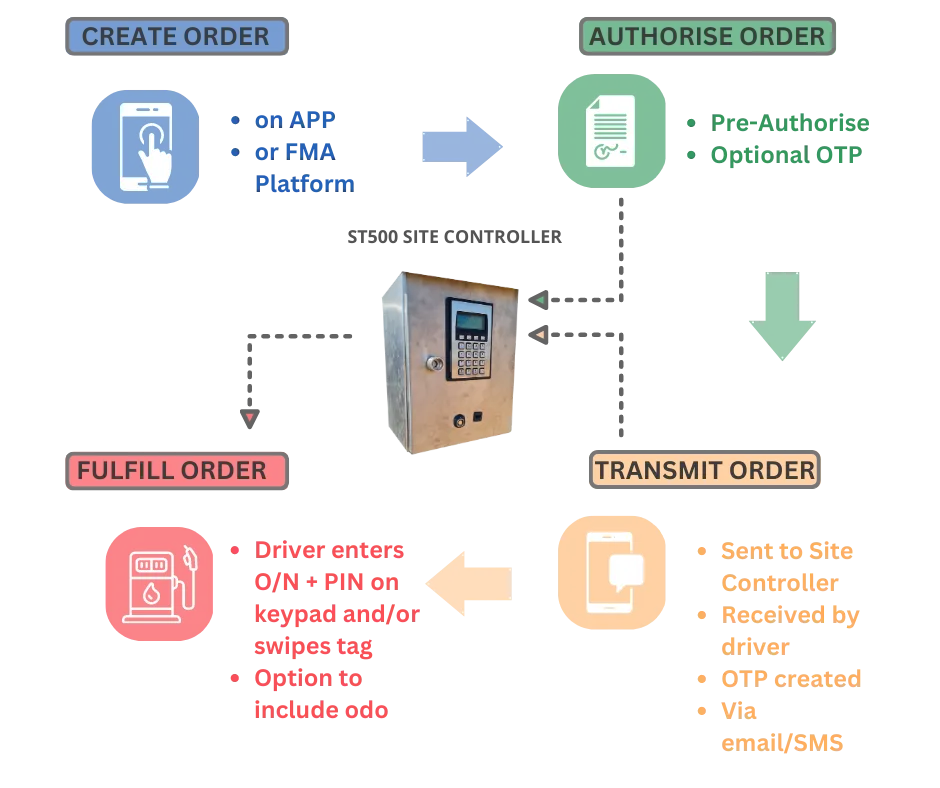As a fleet manager, efficient fuel management is critical for optimising costs and maximizing operational productivity. However, with fuel prices constantly fluctuating, keeping track of fuel expenses can be challenging. That's where fuel accounting best practices come in. In this comprehensive guide, we will explore the tried and tested strategies that can help fleet managers like you streamline fuel accounting.
From implementing automated fuel tracking systems to conducting regular audits, we will delve into the various methods and tools available to help you gain better control over your fuel expenses. We will also discuss the importance of monitoring fuel consumption patterns and analyzing data to identify potential areas for improvement. By following these best practices, you can enhance fuel efficiency, reduce costs, and ultimately increase profitability for your fleet.
Whether you manage a small fleet of vehicles or a large-scale operation, this guide will provide you with valuable insights and actionable tips to optimize fuel accounting. So, let's dive in and discover the key practices that can transform your fuel management processes and drive success for your fleet.
Common challenges in fuel accounting
Effective fuel accounting is a fundamental aspect of fleet management. It allows you to monitor and control one of the largest operating expenses for your fleet - fuel costs. By implementing robust fuel accounting practices, you can gain better visibility into your fuel consumption, identify inefficiencies, and take proactive steps to reduce expenses.
One of the main benefits of fuel accounting is the ability to accurately track fuel consumption for each vehicle in your fleet. This data enables you to calculate the fuel efficiency of individual vehicles and identify any underperforming units that may require maintenance or replacement. Additionally, fuel accounting provides insights into driver behaviour, allowing you to address issues such as excessive idling or aggressive driving that can lead to increased fuel consumption.
Another crucial aspect of fuel accounting is cost control. By closely monitoring fuel expenses and implementing cost-saving measures, you can significantly reduce your fleet's overall fuel costs. This, in turn, translates to higher profitability and improved operational efficiency. Additionally, accurate fuel accounting helps you identify discrepancies or potential fuel fraud, ensuring that every fuel transaction is accounted for and reducing the risk of financial losses.
Fuel accounting best practices for accurate tracking
While fuel accounting is essential, it is not without its challenges. Fleet managers often face several hurdles when trying to effectively track and manage fuel expenses. One common challenge is the lack of accurate data. Without reliable information on fuel consumption, it becomes difficult to make informed decisions and implement targeted strategies for cost reduction.
Another challenge is the manual nature of traditional fuel accounting methods. Relying on paper-based records or spreadsheets can be time-consuming and prone to errors. The need for manual data entry and reconciliation increases the risk of inaccuracies and delays in identifying potential issues. Additionally, manual processes make it challenging to access real-time data and make timely decisions.
Furthermore, fuel theft and fraud can pose significant challenges in fuel accounting. Unauthorized fuel purchases or misappropriation of fuel by drivers can lead to financial losses for the fleet. Identifying and preventing such incidents requires robust fuel accounting practices and effective monitoring systems.
Utilising technology for efficient fuel accounting
To overcome the challenges associated with fuel accounting, fleet managers can implement several best practices for accurate tracking. One of the most effective methods is to utilize automated fuel tracking systems. These systems use advanced technology, such as GPS and telematics, to capture real-time data on fuel consumption, vehicle location, and driver behaviour. By automating the process, you can eliminate manual errors, improve data accuracy, and gain immediate insights into your fuel expenses.
Integrating actual on the ground fueling security with your business or enterprise resource planning platform is the bedrock of what we term “fuel accounting” in this document. Securing your fueling homebase sites with fuel management processes supplied by Fuel Management Africa is the ultimate first place to start. Their systems connect to your tanks and pumps and dispense fuels only to authorised vehicles. At the same time they collect usage stats automatically from the vehicles which allows their systems to calculate consumption rates. In all a robust fuel management system will generate transactions and integrate these into your ERP seamlessly.
Another best practice is to establish clear fuel policies and procedures. By defining guidelines for fuel usage, you can ensure that drivers understand their responsibilities and adhere to fuel conservation measures. This includes setting limits on idling time, enforcing regular vehicle maintenance, and promoting responsible driving habits. Clear policies help create a culture of fuel efficiency within your fleet.
Regular audits are also essential to maintain accurate fuel accounting. Conducting periodic checks of fuel receipts, mileage logs, and vehicle maintenance records can help identify discrepancies and detect any potential fuel fraud. Audits provide an opportunity to verify data accuracy and ensure compliance with established fuel policies.
Implementing fuel efficiency measures in fleet management
In addition to automated fuel tracking systems, there are several other technological tools available to streamline fuel accounting. Fuel management software, for example, provides a centralised platform for tracking fuel consumption, managing fuel cards, and generating detailed reports. These systems integrate with other fleet management software and ERP platforms such as SAP, enabling seamless data sharing and analysis.
Telematics technology can also play a vital role in fuel accounting. By equipping vehicles with telematics devices, fleet managers can access real-time data on fuel consumption, vehicle diagnostics, and driver behaviour. This information allows for immediate intervention in case of any fuel-related issues, ensuring prompt action to reduce costs and improve efficiency.
Furthermore, mobile apps can be used to empower drivers to actively participate in fuel accounting. These apps allow drivers to track their fuel consumption, report any discrepancies, and receive training on fuel-efficient driving techniques. Engaging drivers in the fuel accounting process can lead to increased awareness and cooperation, ultimately contributing to improved fuel efficiency.
Analysing fuel data to identify cost-saving opportunities
To optimise fuel accounting, fleet managers should consider implementing fuel efficiency measures across their operations. One effective strategy is to invest in fuel-efficient vehicles. Modern vehicles equipped with hybrid or electric technology can significantly reduce fuel consumption, resulting in long-term cost savings. Additionally, regular maintenance and vehicle inspections ensure that vehicles are operating at peak efficiency, minimizing fuel wastage.
Route optimisation is another key practice for fuel efficiency. By using GPS technology and advanced routing algorithms, fleet managers can identify the most efficient routes for their drivers. Optimized routes help reduce travel time, minimize mileage, and ultimately save on fuel costs. Real-time traffic updates and weather conditions can also be factored in, allowing for dynamic route adjustments to avoid delays and congestion.
Incorporating driver training programs focused on fuel-efficient driving techniques is crucial for improving fuel efficiency. Educating drivers on proper acceleration, braking, and idling practices can have a significant impact on fuel consumption. Providing incentives for achieving fuel efficiency goals can further motivate drivers to adopt these practices.
Integrating fuel accounting with overall financial management
Accurate and comprehensive fuel data is a goldmine of information that can help fleet managers identify cost-saving opportunities. By analysing fuel consumption patterns, you can uncover inefficiencies and make data-driven decisions to optimize fuel usage. Key performance indicators such as fuel economy, fuel cost per mile, and idle time can provide valuable insights into your fleet's overall performance.
Identifying outliers in fuel consumption can highlight potential issues that require attention. For example, vehicles consistently consuming more fuel than average may indicate maintenance issues or the need for driver training. Analysing data at the driver level allows you to identify top performers and share their best practices with the rest of the fleet.
In addition to internal data analysis, external benchmarking can provide valuable insights. Comparing your fleet's fuel efficiency to industry standards or similar fleets can help identify areas where improvements can be made. This benchmarking process can guide the setting of realistic goals and targets for fuel consumption reduction.
Training and educating staff on fuel accounting procedures
Fuel accounting should be seamlessly integrated with overall financial management practices. By incorporating fuel expenses into your budgeting and forecasting processes, you can accurately allocate resources and identify potential cost-saving opportunities. This integration allows for a holistic approach to financial planning and ensures that fuel expenses are accounted for in all decision-making processes.
Furthermore, integrating fuel accounting with other operational metrics can provide a comprehensive view of your fleet's performance. By analyzing fuel data alongside metrics such as vehicle utilization, maintenance costs, and driver productivity, you can identify correlations and optimize your operations for maximum efficiency.
Conclusion: The impact of effective fuel accounting on fleet management
To ensure the successful implementation of fuel accounting best practices, it is essential to train and educate your staff on the procedures and importance of accurate fuel accounting. All relevant personnel, including fleet managers, drivers, and administrative staff, should be well-versed in fuel accounting practices and understand their roles in the process.
Training programs can cover topics such as fuel-efficient driving techniques, proper fuel card usage, and data entry procedures. Regular refresher courses can help reinforce these practices and keep staff up to date with the latest technologies and industry best practices.
Additionally, fostering a culture of continuous improvement and accountability is crucial. Encouraging open communication and feedback allows for the identification of potential issues and the implementation of corrective actions. Recognizing and rewarding staff for their contributions to fuel efficiency and accurate fuel accounting can further reinforce the importance of these practices.
To find out more speak to the team at Fuel Management Africa. Contact them here: www.fmsonline.co.za/contact-us

